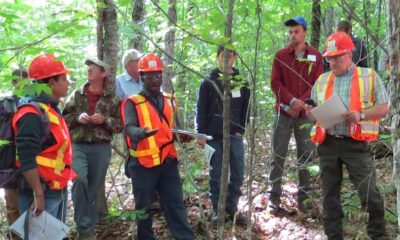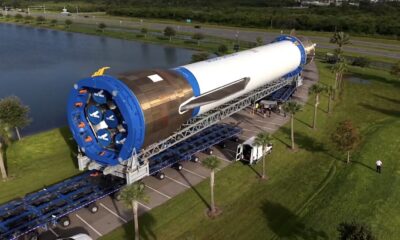Health
Lethbridge Research Team Explores Health Effects of Space Travel

A team of researchers, including Dr. Gerlinde Metz from the University of Lethbridge, has received a grant of $225,000 from the Canadian Space Agency to investigate the health impacts of space travel on astronauts. This funding, announced by federal industry minister Mélanie Joly, will support their work over the next three years, contributing to NASA’s extensive human research efforts.
The research team aims to build on more than a decade of astronaut data collected by NASA, which encompasses physical and psychological assessments of astronauts before, during, and after their missions to the International Space Station. According to Dr. Metz, this data set is particularly valuable, as it provides insights into various health metrics, including cognition, diet, exercise, and environmental conditions experienced in space.
Understanding Health Risks in Space
For over eleven years, researchers at the University of Lethbridge have been analyzing small chemicals found in biofluids such as blood, urine, and saliva from astronauts. Dr. Metz highlights the significance of these studies, stating, “We’re able to get a signature of the chemicals in the blood or in the urine, which is really exciting, because it is a very robust predictor for health problems.”
The objective is to identify pathways associated with potential health risks faced by astronauts. With this knowledge, timely interventions could be implemented, such as dietary adjustments or exercise modifications, helping to alleviate stressors related to space travel. The nutritional biochemist involved in the project is already applying this data to develop appropriate diets for astronauts, ensuring their health and well-being during missions.
Astronauts often endure significant stress due to isolation, microgravity, and exposure to factors like noise and radiation. The research not only seeks to mitigate these stressors but also provides insights into the aging process on Earth. Dr. Metz notes that astronauts exhibit signs linked to aging, including decreased bone density, muscle atrophy, and cognitive decline.
Linking Space Travel to Aging Research
The study aims to identify risks associated with aging and predict who may be susceptible to age-related diseases based on metabolic changes observed in astronauts. Dr. Metz explains the dual purpose of their research: “We are interested, particularly in this project right now, how can we identify risks associated with aging and predict who’s at risk of aging-associated diseases based on these metabolic changes.”
As this collaborative effort unfolds, the findings will not only enhance our understanding of human health in the unique environment of space but also offer valuable insights that could benefit aging populations on Earth. The implications of this research extend beyond space exploration, potentially informing health strategies for individuals facing similar challenges in their everyday lives.
The University of Lethbridge and its research team are poised to contribute significantly to the growing body of knowledge surrounding space travel and its effects on human health, marking a crucial step in understanding how to support astronauts during their missions and improve health outcomes for all.
-

 World3 months ago
World3 months agoScientists Unearth Ancient Antarctic Ice to Unlock Climate Secrets
-

 Entertainment3 months ago
Entertainment3 months agoTrump and McCormick to Announce $70 Billion Energy Investments
-

 Lifestyle3 months ago
Lifestyle3 months agoTransLink Launches Food Truck Program to Boost Revenue in Vancouver
-

 Science3 months ago
Science3 months agoFour Astronauts Return to Earth After International Space Station Mission
-

 Technology2 months ago
Technology2 months agoApple Notes Enhances Functionality with Markdown Support in macOS 26
-

 Top Stories2 weeks ago
Top Stories2 weeks agoUrgent Update: Fatal Crash on Highway 99 Claims Life of Pitt Meadows Man
-

 Sports3 months ago
Sports3 months agoSearch Underway for Missing Hunter Amid Hokkaido Bear Emergency
-

 Politics3 months ago
Politics3 months agoUkrainian Tennis Star Elina Svitolina Faces Death Threats Online
-

 Technology3 months ago
Technology3 months agoFrosthaven Launches Early Access on July 31, 2025
-

 Politics3 months ago
Politics3 months agoCarney Engages First Nations Leaders at Development Law Summit
-

 Entertainment3 months ago
Entertainment3 months agoCalgary Theatre Troupe Revives Magic at Winnipeg Fringe Festival
-

 Politics2 weeks ago
Politics2 weeks agoShutdown Reflects Democratic Struggles Amid Economic Concerns



















